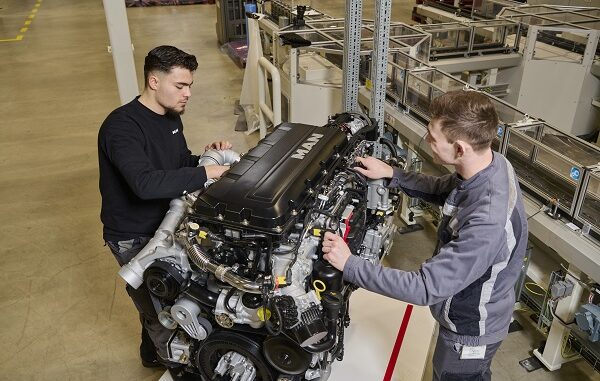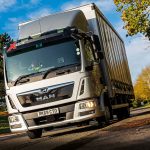
When your time is up, there is an often-used German saying, ‘Alles hat ein Ende, nur eine Wurst hat zwei’, writes Peter Schmitz (Transport News very own European road haulage correspondent).
Translated it means, ‘everything has an end, only a sausage has two’.
The English equivalent, I am told, is ‘nothing lasts forever’.
This aptly sums up news that MAN has started production of its 13-litre MAN D30 diesel engine at its Nuremberg plant, which, it says, will be the last of its kind after more than 100 years of diesel engine manufacturing at the plant.
MAN said it had “invested around 220 million euros in the plant to realise the production and a further 30 million euros for the associated crankshaft production at the Salzgitter plant”.
The D30 is a jointly developed product from the Traton Group, and it will see action on the MAN TGX and TGS tractor units. It will replace the previously available D26 and D15 engine series; and will be available in six power levels from 380 to 560hp and 2,100 to 2,800Nm of torque.
Speaking at a ceremony for the last meilenstein (milestone) of Nuremberg diesels, I must admit surprise that with the European Union’s obsession with decimalisation the word ‘kilometrestone’ is yet to be rubber stamped, CEO of Traton SE Christian Levin was enthused.
“The completely newly developed engine is now also going into operation at MAN and I am sure that MAN customers will be delighted with the new drive,” he said.
MAN CEO Alexander Vlaskamp concurred: “By 2030, every second vehicle we deliver to our customers is to have an emission-free drive. However, this also means that we will still need very efficient combustion engines for a long time on the road to the transformation to electromobility.
“In Nuremberg, we are therefore investing in both technologies, making the location future-proof and putting it on two strong legs. This is how we secure employment. And in Bavaria, we can count on the support of the Bavarian state government so that we can continue on this course.”
A ramp-up of production at the Nuremberg plant will see people work on three shifts to churn out the D30, to allow a technical capacity of around 50,000 engines per year.
The 100 percent switch to electric has no specific date but the manufacturer added: “The diesel engine thus bridges the gap in the transition from combustion engines to electrified drives. Its production launch will take place almost in parallel with the start of battery series production at the plant planned for spring.
“This means that Nuremberg will be producing the centrepieces of the drives for both combustion engines and electrically powered MAN vehicles for many years to come.”





